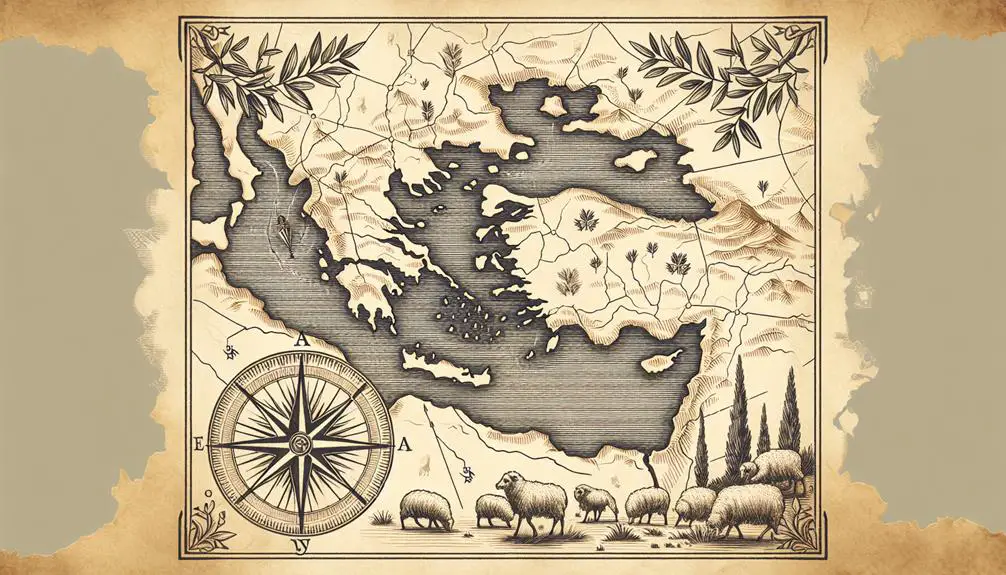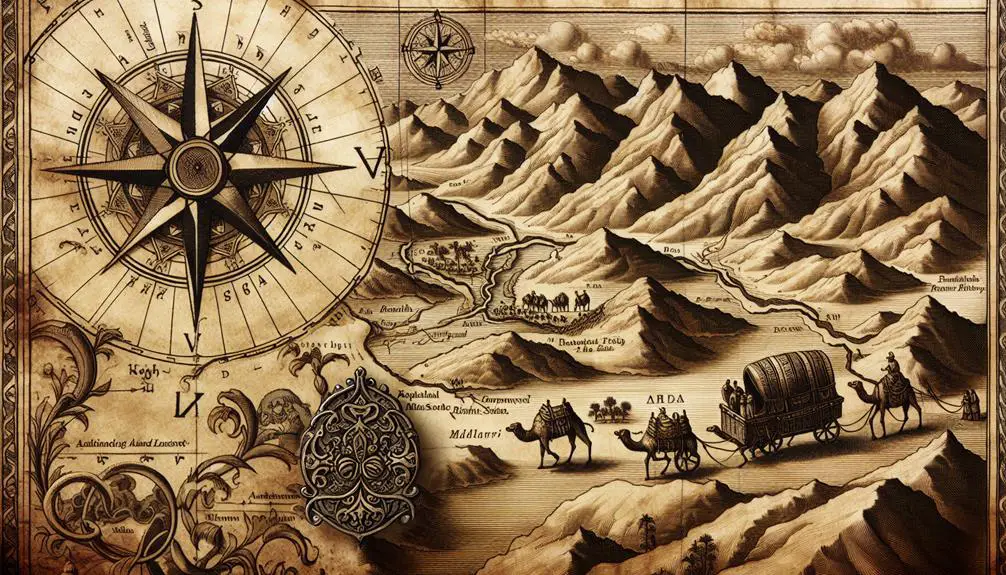Investigate the enigmatic 'Rosh' in biblical prophecy and its mysterious role in shaping historical and theological debates.

Rosh in the Bible
The term 'Rosh' in the Bible has sparked considerable scholarly debate, particularly in its enigmatic appearance in Ezekiel's prophecies. This discussion delves into the multifaceted interpretations of Rosh, exploring its origins, biblical and prophetic contexts, and its implications for understanding historical and geographical narratives within scriptural texts.
By examining linguistic analyses and theological perspectives, we uncover layers of meaning that have influenced modern interpretations and debates. As we navigate through these complexities, one is compelled to consider the broader implications of Rosh on our understanding of biblical history and prophecy, inviting further exploration into its enigmatic presence in sacred scripture.
Key Takeaways
- Rosh symbolizes leadership and ethical responsibility in biblical contexts.
- It has dual significance, representing both literal and metaphorical entities in prophecies.
- Rosh plays a pivotal role in eschatological narratives, symbolizing divine judgment and redemption.
- Its study offers insights into the ancient worldview and the importance of spiritual leadership within communities.
The Origins of Rosh

The term 'Rosh' in the context of biblical literature, often interpreted through linguistic and historical analysis, has origins rooted deeply in ancient texts, suggesting a complex interplay of cultural, geographical, and possibly mythological dimensions. The etymology of Rosh is a subject of scholarly debate, with interpretations ranging from a specific geographical region to a title denoting leadership or headship. This ambiguity in the term's root meaning illuminates the multifaceted nature of language evolution and its contextual application across different historical periods.
Analyzing the cultural significance of Rosh requires a multidisciplinary approach, integrating insights from archaeology, theology, and philology. The term's appearance in ancient manuscripts not only denotes a geographical or political entity but also conveys symbolic meanings tied to authority, primacy, and beginnings. This dual significance of Rosh, as both a literal and metaphorical concept, underscores its importance in understanding the socio-political and religious landscapes of the ancient Near East.
Furthermore, the usage of Rosh within biblical texts reflects the interconnectedness of language, culture, and religion, offering a window into the worldview of the text's authors and their audience. By examining the linguistic roots and cultural connotations of Rosh, scholars can glean insights into the historical context of biblical narratives, the identity of ancient peoples, and the evolution of religious thought.
Rosh in Biblical Prophecy

Having explored the multifaceted nature of Rosh in ancient texts, attention now turns to its role within biblical prophecy, where interpretations further illuminate its significance in religious and historical contexts. Scholars and theologians have long debated the symbolism and implications of Rosh in prophecies, particularly those related to end-time scenarios. The analysis of Rosh within prophetic literature unveils layers of meaning that contribute to a comprehensive understanding of eschatological narratives.
Rosh symbolism is often associated with leadership or headship, suggesting a pivotal role in the unfolding events of the last days. This interpretation is grounded in the etymology of Rosh, which means 'head' or 'chief' in Hebrew. In prophetic contexts, Rosh is sometimes seen as representing nations or entities that play significant roles in end-time scenarios. These interpretations are not without controversy, as the identification of Rosh with specific modern nations or political entities is subject to scholarly debate and varies according to different hermeneutical approaches.
The mention of Rosh in biblical prophecy, particularly in texts that describe alliances or conflicts involving Gog and Magog, has fueled extensive analysis. Scholars dissect these prophecies to understand the geopolitical and spiritual implications of Rosh's involvement. The interpretation of these texts often intersects with discussions on the timing and nature of end-time events, including the battle of Armageddon and the establishment of God's kingdom on earth.
Historical and Geographical Insights

The examination of Rosh within biblical references provides a complex layer of historical and geographical understanding, necessitating a precise analysis of its mention across various scriptures.
Speculation regarding Rosh's exact geographical location has sparked scholarly debate, anchored in the interpretation of ancient texts and archaeological evidence.
This discourse aims to unravel the intricacies of Rosh's identification and its implications for understanding the biblical landscape.
Rosh's Biblical References
Several references to Rosh in the biblical texts offer valuable insights into its historical and geographical significance within ancient Near Eastern contexts. The examination of Rosh genealogy within scriptural narratives provides a foundational understanding of its peoples and their lineage. This exploration not only sheds light on the familial connections that Rosh had with other groups but also highlights the cultural influences that may have shaped its societal structures and interactions with neighboring entities.
These insights are crucial for comprehending the role that Rosh played in the broader tapestry of ancient civilizations. Through a detailed analysis of these references, scholars can piece together the complex mosaic of historical relationships and cultural exchanges that defined the ancient Near East.
Rosh's Location Speculation
In exploring the enigmatic location of Rosh, scholars have engaged in extensive analysis of historical texts and archaeological evidence, piecing together a speculative geography that situates this ancient entity within the complex landscape of the Near East.
- Analysis of ancient manuscripts suggests a geographical positioning of Rosh in relation to known ancient civilizations.
- Rosh artifacts unearthed in diverse locations hint at a widespread cultural or trade network.
- Linguistic studies of the name 'Rosh' indicate possible connections to regions known in ancient texts.
- Comparison with biblical narratives offers clues to its geographical and cultural significance.
- Archaeological sites provide tangible evidence of settlements that may align with descriptions of Rosh, offering insights into its cultural significance and historical context.
Linguistic Analysis of Rosh

A comprehensive linguistic analysis of 'Rosh' reveals its multifaceted significance within biblical texts, necessitating an exploration of its etymology, usage, and contextual interpretations.
The word etymology of 'Rosh' traces back to ancient Semitic roots, connoting 'head,' 'top,' or 'beginning.' This semantic foundation underpins its usage across various contexts within the sacred scriptures, where it is employed both literally and metaphorically. The semantic evolution of 'Rosh' from a simple anatomical reference to a symbol embodying concepts of leadership, priority, and origin illustrates the dynamic nature of language within the biblical narrative.
Further examination showcases 'Rosh' in diverse applications, ranging from temporal markers like 'Rosh Hashanah' (the Jewish New Year, literally 'head of the year') to geographical designations and titular references denoting people of high status or leadership roles. This broad spectrum of use underscores the term's adaptability and the richness of its connotations, which extend far beyond its literal meaning.
Moreover, the term's occurrence within prophetic literature often carries eschatological implications, signifying pivotal moments or entities in the unfolding divine plan. Here, 'Rosh' operates within a complex theological framework, yet this analysis deliberately steers clear of delving into these theological implications, focusing instead on the linguistic and semantic dimensions.
Theological Implications

Exploring the theological implications of 'Rosh' within biblical texts reveals its profound significance in articulating divine principles and eschatological themes. This term's multifaceted nature offers a rich tapestry through which scholars and theologians can explore the depths of scriptural wisdom. Rosh, transcending its literal interpretations, embodies a complex array of symbolism and ethical teachings that resonate with foundational Judeo-Christian beliefs. The exploration into its theological underpinnings not only enriches our understanding of ancient texts but also provides contemporary relevance in navigating moral and spiritual dilemmas.
- Rosh symbolism in leadership and authority: It signifies the role of divine guidance in governance, emphasizing the responsibility of leaders to adhere to God's will and ethical mandates.
- Eschatological significance: Rosh is pivotal in prophetic literature, symbolizing the commencement of God's ultimate redemption and judgment. This underscores the belief in a divinely orchestrated end of times, replete with moral accountability.
- Ethical teachings and community structure: The concept of Rosh within a communal context highlights the importance of ethical leadership and collective adherence to divine laws, promoting societal harmony and spiritual integrity.
- Spiritual headship and individual responsibility: It encapsulates the dual aspects of personal accountability to divine commandments and the communal aspect of spiritual leadership, fostering a balanced approach to faith and ethics.
- Rosh as a marker of time and renewal: Symbolically, it represents new beginnings and the cyclical nature of repentance and renewal, echoing the perpetual opportunity for spiritual growth and redemption.
Through these lenses, the theological implications of Rosh extend beyond mere lexical analysis, engaging with core themes of divine interaction, moral leadership, and the inexorable flow of divine history.
Modern Interpretations and Debates

In contemporary scholarly discourse, the interpretation of 'Rosh' within biblical texts has fostered significant debate, centering on whether it denotes a specific nation or serves as a titular designation.
This divergence in scholarly opinion underscores the complexity of biblical exegesis and the methodologies employed in deciphering ancient texts.
Furthermore, the exploration of Rosh's role within biblical prophecy has amplified these discussions, highlighting the intricate interplay between historical contexts and theological perspectives.
Rosh: Nation or Title?
Modern scholarly debates often hinge on the interpretation of 'Rosh' in biblical texts, questioning whether it refers to a specific nation or serves as a titular designation for a leader or group. The discourse around Rosh symbolism and leadership connotations enriches the context, posing significant implications for historical and theological studies.
- Analyzing the etymology of 'Rosh' to discern its original meanings and implications.
- Investigating ancient texts for instances of 'Rosh' to understand its use contextually.
- Considering the geopolitical landscape of biblical times to identify potential nations or groups.
- Examining the theological significance of leadership roles within the biblical narrative.
- Cross-referencing with contemporary historical records to corroborate or challenge biblical accounts.
This approach allows a detailed and nuanced exploration of 'Rosh', contributing to a broader understanding of its role in biblical history.
Scholarly Opinions Diverge
As scholars delve into the interpretation of 'Rosh' within biblical contexts, opinions are markedly divided, reflecting a spectrum of viewpoints on its historical and theological significance.
The crux of the debate often centers on translation challenges, as the ancient texts offer scant clarity, leaving modern scholars to wrestle with linguistic nuances. These difficulties are compounded by evolving cultural perceptions, which color the interpretation of historical references.
Some academics argue that 'Rosh' denotes a specific nation or entity, drawing on linguistic and archaeological evidence, while others contend it serves more as a titular or symbolic reference, highlighting the complexities of ancient geopolitical landscapes.
This divergence not only underscores the challenges inherent in biblical scholarship but also the dynamic nature of interpreting ancient texts through a contemporary lens.
Prophecy's Role Explored
Exploring the role of prophecy within the context of 'Rosh,' contemporary debates reveal a complex interplay between ancient predictions and their modern interpretations, shedding light on the multifaceted nature of biblical prophecies.
- The interpretation of 'Rosh' in future predictions often hinges on linguistic and historical analyses, aiming to discern literal versus symbolic meanings.
- Scholarly debates focus on whether 'Rosh' pertains to specific geopolitical entities or broader spiritual concepts.
- The relevance of ancient prophecies to contemporary global events is scrutinized, with some viewing 'Rosh' as a key to understanding future developments.
- The symbolic meanings of 'Rosh' are explored in theological contexts, providing insights into spiritual lessons rather than concrete historical predictions.
- Divergent interpretations highlight the challenge of applying ancient prophecies to modern contexts, emphasizing the necessity of a nuanced approach.
Frequently Asked Questions
How Has the Artistic Representation of Rosh Evolved Throughout Christian and Jewish History?
The artistic representation of Rosh has undergone significant evolution in Christian and Jewish history, reflecting diverse Rosh interpretations and symbolic meanings. This evolution is marked by an analytical, detailed, and scholarly exploration of its conceptual significance across cultures and epochs.
The depiction of Rosh has been shaped by theological, cultural, and artistic influences, leading to a rich tapestry of imagery that encapsulates varying symbolic meanings and interpretations, illustrating the depth of its historical and religious significance.
Are There Any Known Rituals or Religious Practices Specifically Associated With the Figure or Concept of Rosh in Ancient Cultures?
Peering through the lens of ancient rituals, the inquiry into religious practices associated with the figure or concept of 'Rosh' beckons a scholarly exploration.
While the interpretation of 'Rosh' within Biblical translations varies, a detailed, analytical examination reveals a scarcity of specific rituals or religious observances directly tied to this entity or concept in ancient cultures.
This gap in historical and religious documentation invites further academic investigation into the nuanced understanding of 'Rosh.'
Can Parallels Be Drawn Between Rosh and Figures or Concepts in Other Ancient Religions Outside the Abrahamic Traditions?
In comparative mythology, analyzing Rosh symbolism reveals intriguing parallels with figures or concepts in non-Abrahamic ancient religions. This scholarly exploration uncovers shared themes of leadership, renewal, and headship, demonstrating a universal tendency to symbolize pivotal concepts with head-related imagery.
Such comparative analysis enriches our understanding of how ancient cultures across diverse traditions conceptualized and venerated aspects of authority and new beginnings, highlighting the interconnectedness of human religious thought.
How Has the Concept of Rosh Influenced Modern Political Ideologies or Movements, if at All?
The influence of historical concepts on modern political ideologies is profound, with certain themes recurring within economic metaphors and cultural narratives.
Analyzing these influences, one observes that principles resembling the concept of leadership and new beginnings, analogous to 'Rosh,' have been integrated into contemporary political movements and ideologies.
These principles serve as foundational elements, guiding the development of economic policies and the construction of national and cultural identities, reflecting a nuanced interplay between tradition and modernity.
What Role Does Rosh Play in Contemporary Religious Observances Among Different Jewish and Christian Communities Today?
In contemporary religious practices, the term 'Rosh' finds its most prominent manifestation in Rosh Hashanah celebrations, marking a significant juncture in the Jewish liturgical year.
Diverse Christian sects also engage with Rosh interpretations, albeit in varied capacities. An analytical exploration reveals that these observances are deeply imbued with historical and theological nuances, offering insights into the evolving nature of religious traditions.
These practices underscore the multifaceted role of Rosh in modern spiritual contexts.
Conclusion
In conclusion, the exploration of Rosh within biblical texts offers a fascinating journey through ancient prophecies, linguistic intricacies, and theological debates. This scholarly examination reveals how historical and geographical insights enrich our understanding of biblical narratives, while linguistic analysis sheds light on the complexities of ancient languages.
The figure of speech, 'a tapestry woven through time,' aptly describes the multifaceted nature of Rosh in biblical discourse, evoking a sense of awe towards the depth of scriptural analysis. Ultimately, modern interpretations continue to fuel scholarly debates, highlighting the enduring significance of Rosh in biblical studies.



Sign up